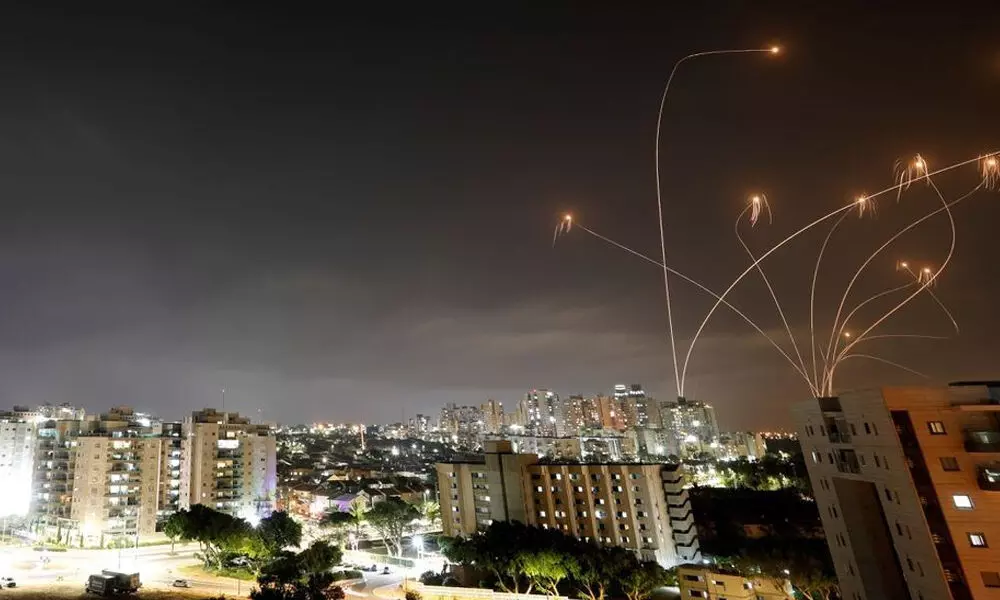Israel sitting on dry tinder, better beware!
image for illustrative purpose

POWER and impunity on one side, hopelessness and desperation on the other, the failure of leadership everywhere: The latest flare-up between Israelis and Palestinians is a distillation of everything that makes their decades-old conflict so combustible. Although the fires in East Jerusalem are unlikely to spark the conflagration everyone fears most, a third Palestinian "intifada," or uprising, that engulfs all of the West Bank and Gaza, the events of recent days are a reminder that the tinder is dangerously dry.
And there are altogether too many arsonists standing ready to set it alight.
In this round of the conflict, the familiar narratives — of Israeli power over Palestinians, and of Palestinian resistance to that power — centre on the East Jerusalem neighborhood of Sheikh Jarrah, where Jewish settlers have for decades been trying to evict six Palestinian refugee families from homes they have occupied since shortly after the 1948 war. The settlers claim the properties were previously owned by Jews and can therefore be seized under an Israeli law that allows Jews to reclaim privately-owned land lost during wartime, a right denied to Palestinians.
Palestinians say this is part of an effort to remove their presence from key areas of the city and "Judaize" Jerusalem by force. Israeli authorities don't deny they hope to restrict the Arab population in the city to less than 30 per cent, from its current 40 per cent.
On Monday, the Israeli supreme court was set to issue a final ruling on the eviction of the refugee families, leading to a sense of tension and growing protests throughout the previous week. Matters came to a head on Friday, after prayers at the Al-Aqsa Mosque on the hotly contested Haram Al-Sharif/Temple Mount complex. Clashes erupted between Palestinians and police, leading to unprecedented scenes of congregants being attacked inside the mosque, one of Islam's holiest sites. Hundreds of Palestinians and a number of police officers were wounded.
A perfect storm seemed to be developing. The supreme court ruling was to coincide with a planned march by Israeli extremists through Arab sections of East Jerusalem on the day Israel celebrates its conquest of the city in 1967.
The Palestinian leadership and the Israeli government had either failed to anticipate the risks of combustion or had not cared to mitigate them.
But the storm did not break. There was less violence on Saturday and Sunday. The court postponed its hearing. The Israeli extremists, finally ordered by the authorities to reroute their march and thus forego much of the intended provocation, simply called it off.
That's when Hamas decided to fire off a rocket barrage from Gaza in the direction of Jerusalem. This caused little damage, but provoked harsh Israeli retaliation that killed at least 20 Palestinians in Gaza, including nine children.
The aerial bombardments might yet set off more violence, but since a sustained Palestinian uprising against Israeli rule is in nobody's interests, cooler heads will likely prevail, at least for now.
In the West Bank, the Palestinian Authority under President Mahmoud Abbas is rebuilding its relationship with Washington after the breakdown during the Trump years and coping with the new regional dynamics created by the Abraham Accords between Israel and several Arab States. These efforts would be greatly complicated by an intifada, and the PA will try to prevent one from breaking out. Hamas is clearly trying to enflame the situation in the West Bank, but the last thing it needs now is another full-blown war between Gaza and Israel. It is struggling to provide the most basic necessities for the two million Palestinians crammed into the narrow strip. With few options and allies, it relies on regular infusions of cash from Qatar, with Israel's approval, to keep most residents fed. An uprising would make matters worse, and deepen Gazans' dissatisfaction over Hamas rule. On the Israeli side, Prime Minister Benjamin Netanyahu, struggling to extend his hold on power, may regard the heightened tensions as useful for rallying political support.

